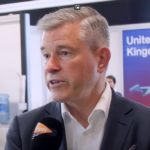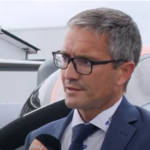Founded in 2014 in Germany, H2Fly has been successfully testing hydrogen powertrains and electric propulsion in a bid to meet jet zero goals ahead of the 2050 deadline, according to the company’s founder Josef Kallo.
The company has conducted seven test campaigns which have shown it is possible to fly with passengers using the new fuel propulsion cross country. “Our plane today, the HY4, shows that it is possible to fly with passengers but also to use liquid hydrogen, and this is a very important step because it shows us from the storage of the fuel to the propulsion, we can have long-range flight,” Kallo explained.
Operations by 2028
The company has now started to upgrade the fuel cell to megawatt capacity, which will give it the opportunity to go into a 40-seater aircraft that will be demonstrated in 2025 and go into commercial operation in 2028/29.
“From a basic technological perspective, we can go up to 27,000ft and have the same power which we have on ground with our new fuel cell system – the H175 – and having this in mind and coupled with the liquid hydrogen, we can go more than 2,000km carrying 40 passengers,” he added.
A major challenge for H2Fly in its quest to create a hydrogen-electric aircraft has been the lack of availability of the right components, so the company has had to develop these itself. “Now, we see major interest from other companies and that accelerates the development of components, so we are able to integrate much faster,” Kallo said.
The company is working with Air Liquide to integrate the liquid hydrogen system into the aircraft and is conducting a test campaign for its HY4 aircraft that will show it can control the full powertrain, from the storage, over the fuel cell to the electric motor.
Exclusive interviews
Watch more exclusive interviews from Paris Air Show 2023 here.
Subscribe to the FINN weekly newsletter
You may also be interested in
H2FLY reaches milestone in development of hydrogen-electric powertrain

